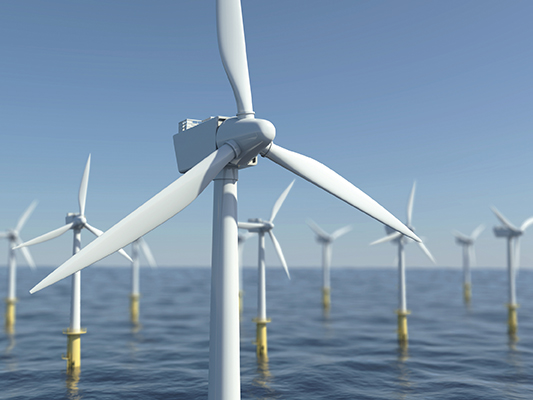
Academic Programme
Reliability baSed StRuctuRal Maintenance foR MaRine Renewable eneRgy (MaReene) Master's Degree

Résumé
This program aims to train structural reliability, monitoring and maintenance specialists in the field of Marine Renewable Energy (MRE). En savoir plusAccéder aux sections de la fiche
Détails

From 2024, 100% in e-learning.
This program is supported by the West Atlantic Marine Energy Community (WEAMEC) and labeled by EMC2, the French industrial cluster dedicated to advanced manufacturing technologies, and the pole of competitiveness on the sea economy "Pôle Mer Bretagne Atlantique".
Présentation
This program aims to train structural reliability, monitoring and maintenance specialists in the field of Marine Renewable Energy (MRE). At the end of this program, you will be able to use and quantify the added value of non-destructive testing techniques and SHM methods applied to offshore structures.
Objectifs
Why choosing this program?
This program has been developed by researchers and teachers-researchers experts in the structural health monitoring of offshore structures from European universities of renown in that field.Nantes Université
Sea and Littoral Research Institute, involved in numerous industrial partnerships, also welcomes the TRUST group, a research group focused on modelling the reliability of structures and developing sensors architectures.NTNU
Marine Technology Department specialises in load computing, force analysis, design methods and structural analysis.AAU
Department of Civil Engineering involved in the development of reliable MRE structures and an internationally recognized research group on issues of probabilistic methods and decision making in monitoring and maintenance planning.UCD
UCD is a key partner of MaREI (center of excellence of the MRE) and hosts specialists of structures and systems. UCD researchers launched the world’s first underwater image processing platform.Lieux
Nantes
Responsable(s) de la formation
Admission
Pré-requis
Candidature
Modalités de candidature
Admission:
To enter this second year of master, applicants should hold a 4 year degree in higher education, equivalent to the first year of a master (i.e. a 3-year Bachelor is not acceptable), for example a 1st year of MSc validated in a field related to the scientific field of the master. Applicants must demonstrate good bases in Finite Element Methods, structural computation, and basic knowledge on reliability (example: degree in mechanical engineering). Applicants should be able to demonstrate their knowledge from transcripts of their degrees.The program is completely delivered in English. Students whose first language is not English must provide proof of a minimum knowledge in English. No requirements in French.
Application:
Students coming from a country using the CEF/Campus France procedure must enroll with Campus France AND also fill an application form here.Students coming from a country not using the CEF/Campus France procedure follow the non CEF-procedure AND also fill an application form here.
Exchange students follow the application procedure AND also fill an application form here.
Costs:
The cost refers to education and training costs that includes additional services such as visits of Nantes and the Pays de La Loire area, visits of industrial sites, preparation to TOEIC, proposals of internships in a company or lab, French courses.More information here.
Academic calendar:
The courses start in early September..Programme
You will study at the Nantes Université during the first semester. During this semester, you will acquire the scientific and technological knowledge necessary to prepare the second semester. The program delivery will combine on campus and distance learning in order to benefit from the expertise of the four partner universities: Nantes Université (UN), Aalborg University (AAU), Norwegian Science and Technology University (NTNU) and the School of Mechanical & Materials Engineering of the College of Engineering and Architecture of University College Dublin (UCD).
During the second semester you will conduct a project/internship in a company or an academic research lab of one of the partner universities (UN, UCD, AAU or NTNU) or in their network, and have the opportunity to develop the practical experience necessary to your future career. You will also participate to online peer-learning activities to enrich your knowledge.
The Master programme is accredited by the French Ministry of Higher Education, Research and Innovation (2nd year of master Mechanichal Engineering). After completion, students will be awarded a master degree delivered by Nantes Université.
More information on the program.
During the second semester you will conduct a project/internship in a company or an academic research lab of one of the partner universities (UN, UCD, AAU or NTNU) or in their network, and have the opportunity to develop the practical experience necessary to your future career. You will also participate to online peer-learning activities to enrich your knowledge.
The Master programme is accredited by the French Ministry of Higher Education, Research and Innovation (2nd year of master Mechanichal Engineering). After completion, students will be awarded a master degree delivered by Nantes Université.
More information on the program.
Contenu de la formation
Third Semester (30 ECTS) (i.e. first semester of this second year of master)
- MRE structures: offshore wind energy and ocean energy
- Design of offshore structures
- Stochastic theory of sealoads
- Numerical methods for uncertainty quantification
- Risk based inspection and value of information
- Risk and reliability in engineering
- Monitoring strategy and monitoring systems
- Probabilistic modelling of degradations
- Wind loads on structures
- Technical communication
- Problem Based Learning (PBL)
Fourth Semester (30 ECTS) (i.e second semester of this second year of master)
- Internship or project
- Workshops
Et après ?
Niveau de sortie
Bac+5
(Libellé inconnu)
Compétences visées
General skills :
- Analyze and model a problem
- Perform numerical calculations with uncertainties
- Identify a model
Transversal skills :
- Analyse the results obtained
- Communicate orally and write the results of a methodological or technical study in a synthetic and pedagogical way
- Produce a bibliography (state of the art) of the works on a technical subject in order to apprehend the globality and the scope of the treatments, and to self-train
- Lead a project from the description of its specifications to its fulfillment
Specific skills :
- Identify needs for MRE based on basic design of MRE structures
- Define the basic elements of the calculation of complex structure reliability and be able to apply them to real situations
- Identify, select and quantify the added value of Non Destructive Tools and SHM systems
- Evaluate information and optimise the maintenance of MRE structures in terms of reliability and cost (risk analysis)
- Work in a team for the fulfillment of projects in an international context
Débouchés professionnels
Secteurs d'activité ou type d'emploi
Sectors:
Energy Sector, Marine and Renewable Energy, electricity, gas, oil, nuclear.
Occupations:
- Higher education and academic research
- Research and Development functions
- Structural Health Monitoring (SHM) specialists
- Project Manager
- Researcher (after a PhD)
La charte des examens de Nantes Université
Consulter les règles communes de contrôle des connaissances
NB : Ces règles communes sont à compléter par les dispositions spécifiques mentionnées dans le règlement propre à chaque formation.
NB : Ces règles communes sont à compléter par les dispositions spécifiques mentionnées dans le règlement propre à chaque formation.
Mis à jour le 20 février 2024.

